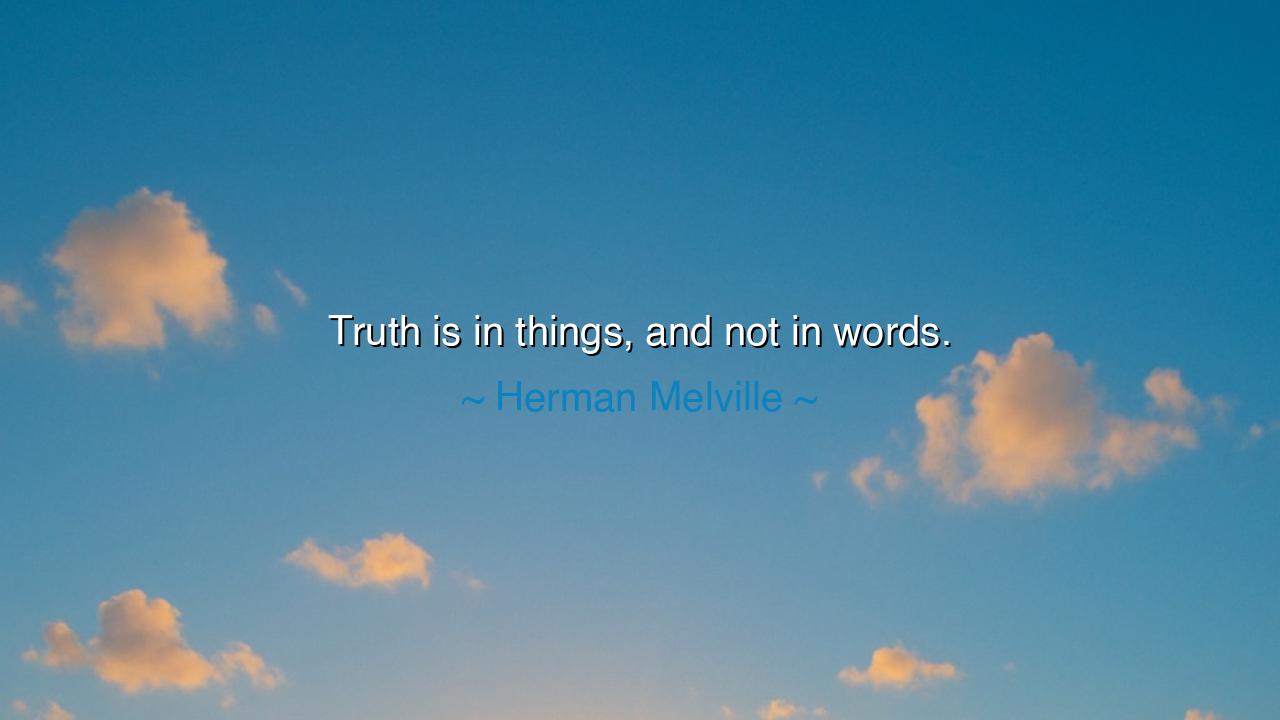
Truth is in things, and not in words.






The words of Herman Melville—“Truth is in things, and not in words.”—fall like a hammer against the fragile walls of rhetoric. In them lies a profound warning: that truth does not dwell in the cleverness of speech nor in the beauty of sentences, but in the raw reality of life itself. Words may dazzle, they may deceive, they may comfort or confuse, but the essence of what is real exists apart from language. The rising of the sun, the death of a loved one, the hunger of the poor—these are things, and they bear their own truth whether or not a tongue moves to describe them.
The origin of this teaching lies in Melville’s own wrestling with reality, most famously in Moby-Dick. His tale is thick with words, yet at its heart burns the recognition that words cannot capture the enormity of the whale, nor the infinite ocean, nor the inscrutable will of God. The truth of the sea is in its waves, in its storms, in its silence—not in the sailor’s logbook. Thus, Melville reminds us that life itself, in its solid and unyielding nature, holds the truth, while words are but shadows trying to trace its shape.
History, too, confirms this wisdom. Consider the American Civil Rights Movement. For generations, words were spoken—eloquent speeches, legal arguments, promises inscribed on paper. Yet the truth of injustice was not in those words, but in the lived reality of segregated schools, lynched bodies, and denied rights. It was only when people bore witness to the things—the marches, the beatings, the courage of ordinary men and women—that the conscience of a nation was stirred. Words alone might have been dismissed, but the undeniable truth of lived experience broke chains.
So too in the realm of science. Before Galileo, words of tradition declared that the sun revolved around the earth. But the truth was in the stars themselves, in the movements of the planets that no decree could change. Words bent and twisted to maintain illusion, but the things of the heavens bore silent witness to reality. And in time, it was the evidence of things—not the arguments of men—that revealed the order of the cosmos.
Melville’s declaration humbles us. Too often, we cling to language as though mastery of words equates to mastery of truth. We mistake eloquence for wisdom, or slogans for reality. But truth cannot be invented by speech—it must be discovered in the ground of things as they are. The earth remains round, whether we sing it in poetry or deny it in folly. Suffering remains real, whether we acknowledge it or not. Truth waits, patient and eternal, unmoved by human chatter.
Yet this insight is not meant to diminish the power of words, but to place them rightly. Words are vessels, guides, or torches that may point toward truth—but they are not truth itself. To mistake them for reality is to live in illusion. To recognize their limits is to walk in wisdom. Let us use words, then, not as idols to worship, but as tools to draw near to what is real.
The lesson is clear: Seek truth not first in speech, but in reality. Look to things—to the evidence of life, to the fruits of action, to the reality before your eyes. Do not be swayed by rhetoric alone, but test it against what is. In your daily life, do not cling to appearances or fine words, but measure everything by its substance. For as Melville teaches, truth is in things, and not in words—and only those who live by this wisdom will stand firm when illusions collapse.






HTHoang Tung
Melville’s perspective makes me reflect on how often words fail to capture the full essence of what we experience. Could truth, as he says, be found in the things themselves, rather than our interpretation of them? It’s almost like the idea that reality is greater than what we can verbalize. Is it possible that the truest moments of life are those where words fall short, and we simply experience without needing to explain?
BHBao Ha
This quote brings up an interesting idea about the limitations of language. Can we trust that words are capable of conveying the complete truth? It seems like Melville is suggesting that truth exists independently of how we attempt to describe it. How does this affect our communication with others? Are we merely approximating truth with words, and is that enough, or do we need to go beyond words to truly understand the world?
STSon Tran
I like the concept that truth is embedded in the things themselves, not in how we talk about them. It feels like Melville is pointing to a deeper understanding that transcends language. But if truth is found in things, how do we fully access it? Can we know the truth of a thing without interpreting it through words, or is language necessary to make sense of what we experience?
PLPhuongthao Le
Melville’s idea that ‘truth is in things, and not in words’ makes me think about how language can sometimes obscure reality. We use words to describe our experiences, but does that mean the essence of the experience is lost in translation? Can we ever truly capture the fullness of truth, or does it always remain just beyond the reach of language? How much of what we say is just a poor approximation of the real world?
HN26. Tran Thi Hong Ngan
I find this quote fascinating because it implies that words are limited in their ability to convey truth. When we talk about the world, we are often trying to translate our experiences, but do words ever really do justice to what we perceive? Are things themselves more authentic than how we try to explain them? Can we ever truly understand reality, or is our grasp on it always distorted by language?